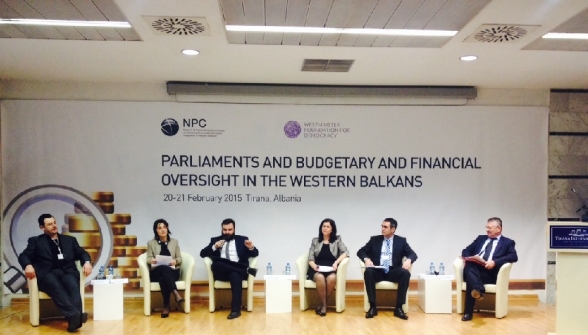20 and 21 February 2015
Regional parliamentary conference on the topic: “Parliaments and budgetary and financial oversight in the Western Balkan countries” ended in Tirana today.
The Conference, attended by MPs and representatives of eight parliaments of the Western Balkans, as well as experts for budget, financial policy and representatives of state audit institutions, was held in the organisation of the Westminster Foundation for Democracy in cooperation with the Parliament of the Republic of Albania and Regional Network of Parliamentary Committees on Economy, Finance and European Integration of the Western Balkans.
During the third panel on the topic: “Parliaments and financial oversight and audit”, the following spoke on relation of parliaments, committees on budget and control of spending public finances and state audit institutions: former President of the National Assembly of Serbia Mr Radojko Obradović, Chair of the Committee for Oversight of Public Finances in the Parliament of Kosovo Mr Besnik Bislimi, Budget Expert from Albania Mr Gjergj Tenexhiu and member of the Commission on Budget in the House of Representatives of the Parliamentary Assembly of Bosnia and Herzegovina Mr Mirsad Isaković.
Chairperson of the Committee on Economy, Finance and Budget of the Parliament of Montenegro, who is also a member of the Network Board, Mr Aleksandar Damjanović spoke as a panellist during the fourth session, on the topic: “Implementing the transition from line to budgetary planning”. MP Damjanović assessed that introduction of programme budget was a key mechanism for strengthening transparency and fiscal responsibility in the process of planning, adopting and monitoring of the state budget, without which the state would not be able to point out to key essential weaknesses by auditing the performance. Chairperson of the Committee competent for budgetary issues in the Parliament of Montenegro stated that, even though the programme budget has been introduced in Montenegro by the Decision of the Government of Montenegro on the Manner of the Budget Preparation and Programme Budget Contents of 2008, and it was also defined by the new systemic Budget Law, consumer units still did not have clear aims nor indicators as tools for monitoring results. The Committee Chairperson Mr Damjanović concluded that programme budgeting was associated with the implementation of public policies, pointing out to the importance and the need for further exchange of experiences through regional conferences and meetings, for the purpose of finding the best practices for the transition from linear to program budgeting.
During the concerned-fourth session, concentrated on the issue of consequences for parliaments and their role in the program budgeting, the following also spoke: Director of the Budget Department in the Ministry of Finance of the Albanian Government Mr Mimoza Dhembi; Senior Researcher at the Centre for Economic Analysis (CEA) from Macedonia Mr Borce Trenovski; University professor and former Chairperson of the Joint Committee on Economic Reforms and Development in the House of Representatives of Parliamentary Assembly of Bosnia and Herzegovina Ms Danijela Martinović andDean of the Faculty of Economics at the University of Tirana Mr Sulo Hadera.
In addition to MP Mr Aleksandar Damjanović, in the capacity of representatives of the Parliament of Montenegro, the following also took part in the work of the second day of the conference,: Mr Veljko Zarubica, Mr Almer Kalač and Mr Genci Nimanbegu.
Upon the completion of the fourth panel, the conclusions and recommendations were adopted:
During the discussion, at the regional conference in Tirana, Albania, of 20 and 21 February 2015, a number of key things, conclusions and recommendations were pointed out by parliaments and experts from the budgetary field from the Western Balkans. Conclusions and recommendations are not biding for parliaments and may serve as point for action which will be proposed by members of the committees and members of parliamentary committees on economy, finance and European integration of the Western Balkans, in order to improve budgetary and financial oversight in the Western Balkans.
Conclusion and recommendations of the Regional Network of Parliamentary Committees on Economy, Finance and European Integration of the Western Balkans
1. Parliaments play a key role in implementing the oversight of budget, and there is a greater need for inclusion of the Western Balkans’ parliaments with regard to issues of implementing the oversight of budget and financing.
2. Administrative and financial capacities of parliaments should be furtherly developed for the purpose of implementing the financial oversight; sharing the best regional practices through NPC may serve as a good model for providing further development of financial oversight practice in the Western Balkans’ parliaments.
3. Western Balkans’ countries are facing the problems of austerity and debt. Parliaments are key institutions where a debate on solutions should be held, thus the parliaments should have an approach to quality analytical data and to be included with all other included sides.
Conclusion and Recommendations are related to the fields of fiscal transparency, processes of adopting budget, establishing parliamentary offices for budget, strengthening the role of parliamentary committees in implementing oversight, transition from traditional towards programme budgeting in the field of the state audit.









